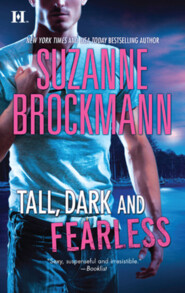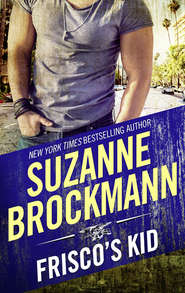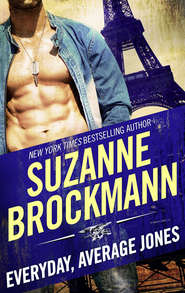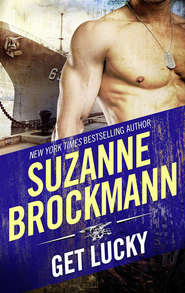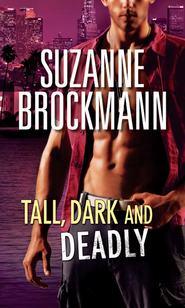По всем вопросам обращайтесь на: info@litportal.ru
(©) 2003-2025.
✖
Taylor's Temptation
Автор
Год написания книги
2018
Настройки чтения
Размер шрифта
Высота строк
Поля
“You gotta help me, man,” Wes said. “She’s determined to go, she flippin’ hung up on me and wouldn’t pick up the phone when I called back, and I’m going wheels-up in less than twenty minutes. All I could do was send her e-mail—though fat lotta good that’ll do.”
“She” was Colleen Mary Skelly, his best friend’s little sister. No, not little sister. Younger sister. Colleen wasn’t little, not anymore. She hadn’t been little for a long, long time.
A fact that Wes didn’t seem quite able to grasp.
“If I call her,” Bobby pointed out reasonably, “she’ll just hang up on me, too.”
“I don’t want you to call her.” Wes shouldered his seabag and dropped his bomb. “I want you to go there.”
Bobby laughed. Not aloud. He would never laugh in his best friend’s face when he went into overprotective brother mode. But inside of his own head, he was rolling on the floor in hysterics.
Outside of his head, he only lifted a quizzical eyebrow. “To Boston.” It wasn’t really a question.
Wesley Skelly knew that this time he was asking an awful lot, but he squared his shoulders and looked Bobby straight in the eyes. “Yes.”
Problem was, Wes didn’t know just how much he was asking.
“You want me to take leave and go to Boston,” Bobby didn’t really enjoy making Wes squirm, but he needed his best friend to see just how absurd this sounded, “because you and Colleen got into another argument.” He still didn’t turn it into a question. He just let it quietly hang there.
“No, Bobby,” Wes said, the urgency in his voice turned up to high. “You don’t get it. She’s signed on with some kind of bleeding-heart, touchy-feely volunteer organization, and next she and her touchy-feely friends are flying out to flippin’ Tulgeria.” He said it again, louder, as if it were unprintable, then followed it up by a string of words that truly were.
Bobby could see that Wes was beyond upset. This wasn’t just another ridiculous argument. This was serious.
“She’s going to provide earthquake relief,” Wes continued. “That’s lovely. That’s wonderful, I told her. Be Mother Teresa. Be Florence Nightingale. Have your goody two-shoes permanently glued to your feet. But stay way the hell away from Tulgeria! Tulgeria—the flippin’ terrorist capital of the world!”
“Wes—”
“I tried to get leave,” Wes told him. “I was just in the captain’s office, but with you still down and H. out with food poisoning, I’m mission essential.”
“I’m there,” Bobby said. “I’m on the next flight to Boston.”
Wes was willing to give up Alpha Squad’s current assignment—something he was really looking forward to, something involving plenty of C-4 explosives—to go to Boston. That meant that Colleen wasn’t just pushing her brother’s buttons. That meant she was serious about this. That she really was planning to travel to a part of the world where Bobby himself didn’t feel safe. And he wasn’t a freshly pretty, generously endowed, long-legged—very long-legged—redheaded and extremely female second-year law student.
With a big mouth, a fiery temper and a stubborn streak. No, Colleen’s last name wasn’t Skelly for nothing.
Bobby swore softly. If she’d made up her mind to go, talking her out of it wasn’t going to be easy.
“Thank you for doing this,” Wes said, as if Bobby had already succeeded in keeping Colleen off that international flight. “Look, I gotta run. Literally.”
Wes owed Bobby for this one. But he already knew it. Bobby didn’t bother to say the words aloud.
Wes was almost out the door before he turned back. “Hey, as long as you’re going to Boston…”
Ah. Here it came. Colleen was probably dating some new guy and…Bobby was already shaking his head.
“Check out this lawyer I think Colleen’s dating, would you?” Wes asked.
“No,” Bobby said.
But Wes was already gone.
Colleen Skelly was in trouble.
Big trouble.
It wasn’t fair. The sky was far too blue today for this kind of trouble. The June air held a crisp sweetness that only a New England summer could provide.
But the men standing in front of her provided nothing sweet to the day. And nothing unique to New England, either.
Their kind of hatred, unfortunately, was universal.
She didn’t smile at them. She’d tried smiling in the past, and it hadn’t helped at all.
“Look,” she said, trying to sound as reasonable and calm as she possibly could, given that she was facing down six very big men. Ten pairs of young eyes were watching her, so she kept her temper, kept it cool and clean. “I’m well aware that you don’t like—”
“‘Don’t like’ doesn’t have anything to do with it,” the man at the front of the gang—John Morrison—cut her off. “We don’t want your center here, we don’t want you here.” He looked at the kids, who’d stopped washing Mrs. O’Brien’s car and stood watching the exchange, wide-eyed and dripping with water and suds. “You, Sean Sullivan. Does your father know you’re down here with her? With the hippie chick?”
“Keep going, guys,” Colleen told the kids, giving them what she hoped was a reassuring smile. Hippie chick. Sheesh. “Mrs. O’Brien doesn’t have all day. And there’s a line, remember. This car wash team has a rep for doing a good job—swiftly and efficiently. Let’s not lose any customers over a little distraction.”
She turned back to John Morrison and his gang. And they were a gang, despite the fact that they were all in their late thirties and early forties and led by a respectable local businessman. Well, on second thought, calling Morrison respectable was probably a little too generous.
“Yes, Mr. Sullivan does know where his son is,” she told them levelly. “The St. Margaret’s Junior High Youth Group is helping raise money for the Tulgeria Earthquake Relief Fund. All of the money from this car wash is going to help people who’ve lost their homes and nearly all of their possessions. I don’t see how even you could have a problem with that.”
Morrison bristled.
And Colleen silently berated herself. Despite her efforts, her antagonism and anger toward these Neanderthals had leaked out.
“Why don’t you go back to wherever it was you came from?” he told her harshly. “Get the hell out of our neighborhood and take your damn bleeding-heart liberal ideas and stick them up your—”
No one was going to use that language around her kids. Not while she was in charge. “Out,” she said. “Get out. Shame on you! Get off this property before I wash your mouth out with soap. And charge you for it.”
Oh, that was a big mistake. Her threat hinted at violence—something she had to be careful to avoid with this group.
Yes, she was nearly six feet tall and somewhat solidly built, but she wasn’t a Navy SEAL like her brother and his best friend, Bobby Taylor. Unlike them, she couldn’t take on all six of these guys at once, if it came down to that.
The scary thing was that this was a neighborhood in which some men didn’t particularly have a problem with hitting a woman, no matter her size. And she suspected that John Morrison was one of those men.
She imagined she saw it in his eyes—a barely tempered urge to backhand her—hard—across the face.
Usually she resented her brother’s interference. But right now she found herself wishing he and Bobby were standing right here, beside her.
God knows she’d been yelling for years about her independence, but this wasn’t exactly an independent kind of situation.
She stood her ground all alone, wishing she was holding something more effective against attack than a giant-size sponge, and then glad that she wasn’t. She was just mad enough to turn the hose on them like a pack of wild dogs, and that would only make this worse.
There were children here, and all she needed was Sean or Harry or Melissa to come leaping to her aid. And they would. These kids could be fierce.
But then again, so could she. And she would not let these children get hurt. She would do whatever she had to do, including trying again to make friends with these dirt wads.






